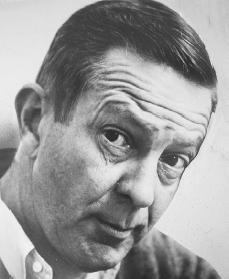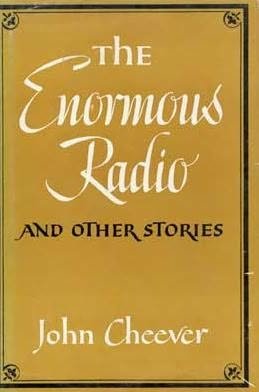Meet my guest, John Cheever, on this edition of Words to Learn
Welcome to my next “Words to Learn” post. This series is about fabulous vocabulary words, and this particular post demonstrates John Cheever’s use of what we sometimes call “heightened vocabulary.”
Additionally, you will find a ton of great resources here for fiction writers.
Meet my guest, John Cheever, on this edition of Words to Learn

(Image credit: Wikimedia Commons - public domain image.)
John Cheever was undeniably one of the greatest short story writers of the 20th Century. I should probably say he “was considered one of the greatest,” but find me someone who disagrees. Cheever was a master of plot and story. He had a gift for character building, and for describing some of the disturbingly bourgeois behaviors of the middle class. While these are not topics most of us want to cover, we can learn from him about the wonderful craft of storytelling.

(Image credit: Fantastic Fiction Book Cover from Wikimedia Commons. Used by permission with attribution to www.fantasticfiction.co.uk.)
Fun with vocabulary: why words matter
This post is about words--vocabulary. The reason vocabulary is of interest is because it can enrich your writing, if you are a fiction writer or a non-fiction writer. And otherwise, it can enrich your language skills for speaking and conversation. My focus is fiction writing, so that’s the slant of this post. I have populated this post with links to great articles by some of my writing colleagues on the various topics mentioned, and have provided more at the end.
I personally feel that our ability to use and understand a broader vocabulary is shrinking over time. But that is purely personal observation. I hope this post will help you feel brave enough to toss the occasional SAT word into your creative writing and trust that your readers will simply understand its meaning by context if they are unfamiliar with the word.
Study the masters to improve your writing
Before we launch into looking at Cheever's fiction and how he uses fabulous vocabulary words, let's talk about why it's important to read and learn from the works of successful writers.
Like artists, fiction writers do well to study the works of the masters. We can look at the mechanics of their writing and learn from them. Here are some questions to ask as you read the works of successful writers, and some links to help you learn more about why these are important aspects of great fiction writing.
- How does the author hook the reader at the start of the story? See these excellent writing resources by @thinknzombie:
- What are the characteristics of the author’s writing voice?
- How does the author use point of view? Here I have several related resources:
- Perspective and POV in fiction; this is a post I wrote that provides an overview of the concepts of perspective and “point of view” (POV), and how they differ.
- The Eye of the Beholder: Different POVs in Writing, by @tinypaleokitchen; this post is part of Tiny’s “Tiny Teaches” series and is an awesome intro to the importance of POV.
- Walk a Mile in My Shoes: Limited POV, by @tinypaleokitchen; this post talks in depth about limited POV.
- How does the author build a story arc? See @bex-dk's excellent post about the importance and key aspects of story arcs in fiction.
If you are a new fiction writer, I encourage you to review these helpful resources and then think about the mechanics of writing and how successful writers put these to work as you read the stories of the masters.
I will plan to write a post that uses a specific story to examine these mechanics at work. This post is an introduction to John Cheever, for those who have not read his work, and specifically discusses how he played with vocabulary in his writing.
Here are links to two Cheever stories you can read online:
- The Swimmer, published in the New Yorker July 18, 1964
- Goodbye, My Brother, available on the Short Story Masterpieces site.
The vocabulary of Cheever
Let’s look at some of the fairly extravagant words Cheever used in his story Goodbye, My Brother. First, to answer the question you may be asking, “should I use big words like this in my writing?” The answer is simply that it is up to you. See the writing voice posts. But here is something to think about as you read the story: Cheever’s writing is overall very friendly and readable. He doesn’t make the reader work hard to read and understand the meaning of his writing. He uses longer, more interesting words sparingly, the way an excellent cook adds a special spice.
Here are examples from “Goodbye, My Brother,” which is told in first person, and opens with these captivating lines:
We are a family that has always been very close in spirit. Our father was drowned in a sailing accident when we were young, and our mother has always stressed the fact that our familial relationships have a kind of permanence that we will never meet with again.
Be sure to have a look at the resources I linked above for hooking the reader with a great openings!
Vocabulary examples from Cheever's story:
Diana is as pretty as Mother must have been; she is an animated and lovely woman who likes to talk about the dissolute friends that she has made in France….
“Dissolute” means debauched, wild or drunken.
*"We don't have any rum," Mother said. It was the first note of asperity.
“Asperity” means a harshness of tone or manner.
Beyond this, she is deeply concerned with the propriety of her house, and anything irregular by her standards, like drinking straight rum or bringing a beer can to the dinner table, excites in her a conflict that she cannot, even with her capacious sense of humor, surmount.
“Capacious” means expansive or spacious.
The branch of the Pommeroys to which we belong was founded by a minister who was eulogized by Cotton Mather for his untiring abjuration of the Devil.
“Abjuration” means repudiation or renunciation.
It's her privilege, and she doesn't get drunk often, and fortunately she wasn't bellicose, but we were all conscious of what was happening.
“Bellicose” means belligerent, hostile, or aggressive.
I thought that Lawrence by now would be tired from his journey and his return, but he remained on the terrace, as if he were waiting to see the final malfeasance, and the rest of us left him there and went swimming in the dark.
“Malfeasance” is wrong-doing.
The faint blue line of chalk had reminded him of these ideas, the scarified door had reinforced them, and now clue after clue presented itself to him….
“Scarified” in this context means marred or disfigured.
He neglected to name the curative powers of the open sea, but it was one of the few chances for diminution that he missed.
“Diminution” in this context means to reduce in importance.
He looked particularly saturnine.
“Saturnine” means slow and gloomy.
She may have been taught, when she was young, to spend her time like this, or she may be at the mercy of an expiatory passion.
“Expiation” means to make amends, so “expiatory” means the act of expiation.
She seems to scrub and iron with a penitential fervor, although I can't imagine what it is that she thinks she's done wrong.
“Penitential” means to be contrite, as in sorry and wishing for forgiveness.
I hope you've enjoyed this foray into the vocabulary of John Cheever, and that it inspires you to use beautiful words as the spice in your own writing!
More resources for writers:
- Comma splices: Forget the hot glue gun. Get the scissors. This post in @tinypaleokitchen’s “Tiny Teaches” series teaches you how to avoid writing run-on sentences, which are one of the most common errors we find in newbie writing.
- Write or Wrong: What to Avoid When Crafting Your Stories. @caleblailmusik provides some valuable grammatical advice on the use of the words lie, lay, laid and lain.
- Loose Body Parts and How to Keep Them Attached. @therosepatch provides some excellent education on some of the common errors new writers make that make it sound like the character's eyes and appendages are disconnected from their bodies. It's a great read.
Thanks for reading!
Are you a writer looking for a writing community and editorial support? Join us at The Writers' Block on Discord. And be sure to follow @thewritersblock.


Ah yes. A great summary and list of resources, @jayna.
I'm not entirely convinced that today's 'modern' reader can handle the same vocabulary that our literary forefathers rolled out with practiced ease. But, in the right context and writing style, a massive vocabulary is an asset; a pool to draw from to enable you to pick the right word in the right situation. One just has to know when to scale back that pool to something smaller when writing for a more...casual audience.
I agree! That's one of the things I loved about C.S. Lewis. He had a MASSIVE vocabulary, which is quite evident when you read most of his books. But The Chronicles of Narnia he scaled back quite a bit since he was writing them for children. But scaling back doesn't mean you forsake the quality of your writing. I love how he did it for Narnia, and I believe anyone can be capable of it.
Agreed on all counts. If we tried to write in the style of Cheever today’s wouldn’t fly. I like the term “literary forefathers.” But as you said, the right word at the right time can be a wonderful thing.
You’ve read enough of my writing here, dear heart, to know that one of the things I like to do is disregard conventional grammar for effect occasionally, most commonly leaving out the subject of the sentence. I like it and it serves my purposes, but.... I have some guilt about contributing in my small way to the general lowering of standards.
The way I make my peace with it is my belief that English is a living, breathing thing. It changes constantly and will be what it will be, my posts with wonky grammar notwithstanding. Maybe the best analogy is that I think English is the ocean into which we toss our little stones. It can take it.
I like this post. At a minimum, it sparked an interesting conversation about the modern writer’s relationship to Vocabulary, capital V. But more than that, it explored one of the masters you suggest we read. Well done. By shining a light on his effective use of a richer vocabulary, you are throwing a very pretty sort of stone into the sea.
Thank you for your thoughtful comment, sis! Yes, our language is living and breathing. You have a lovely turn of phrase. I think creativity is more important than perfection. When it really matters, i.e. when we co-write our soon-to-be-famous collection of quirky sister essays, there will be editors to make sure we got it right.
I love you! And I’m in!
Oh my! I guess we'd better have us a little chit chat!
I love how, instead of just choosing a word to define and show examples of, you actually brought an accomplished author to the table, and showed how he uses larger vocabulary in his writing. It's interesting to show how he wove these words into his writing like a seamstress will weave the right types of threads into the right places to keep a garment together. Great post!
Thank you, @therosepatch! I love the seamstress analogy.
I find just a few carefully chosen, more obscure words can elevate a piece without making it inaccessible. It is a careful balance to achieve.
Yes exactly. You said that so succinctly! Okay everybody, disregard the post and just read @prydefoltz’s comment! 😀
Ha! We talked about "malfeasance" in Creative Writing for, like, 15 minutes on Thursday.
Also, curses! You used, like, all 123 words I was gonna do for #learnwords posts :P
I'm messing, duh.
I haven't read his work. I guess I'll have to before I'm flogged by every English Englisher ever.
You seriously discussed the word “malfeasance”? Love it! Oh the word options are endless. We will never run out. Do eeet.
Anything I should start with?
I have a million ideas for you. Maybe you and @therosepatch and I should assemble a spreadsheet together. :-)
You could piggy-back off this post and write about the word "sumptuary," which Cheever uses three times in The Five-Forty-Eight.
And I'll take that as a recommendation?
Well you did ask for one! 😊